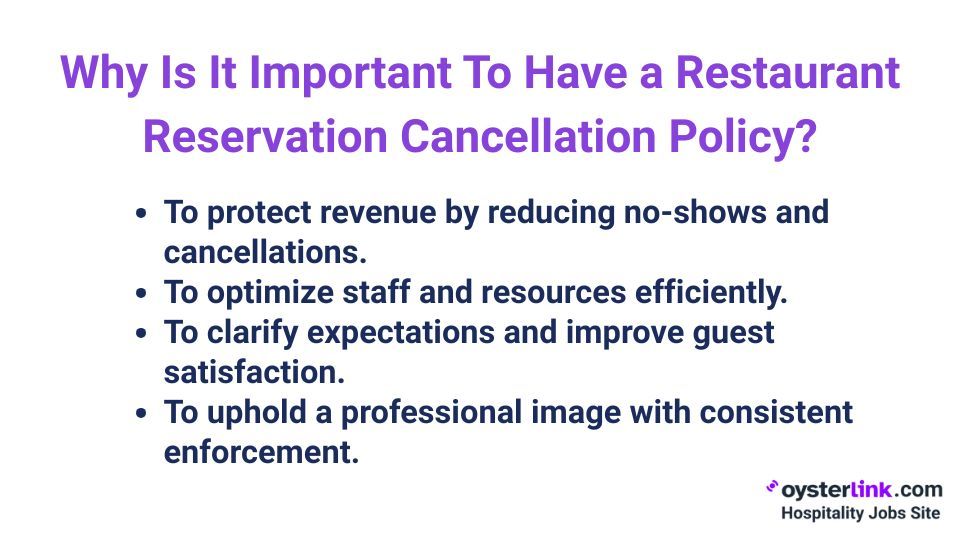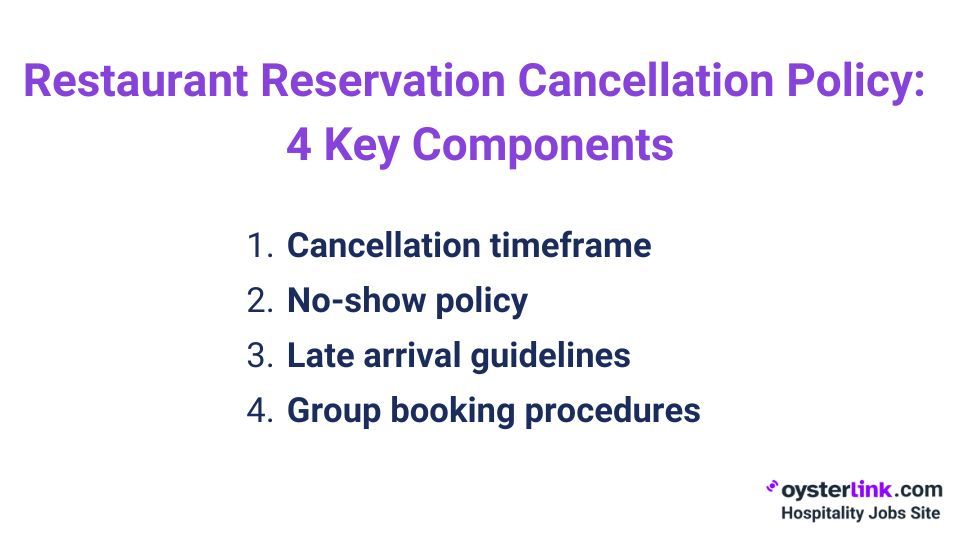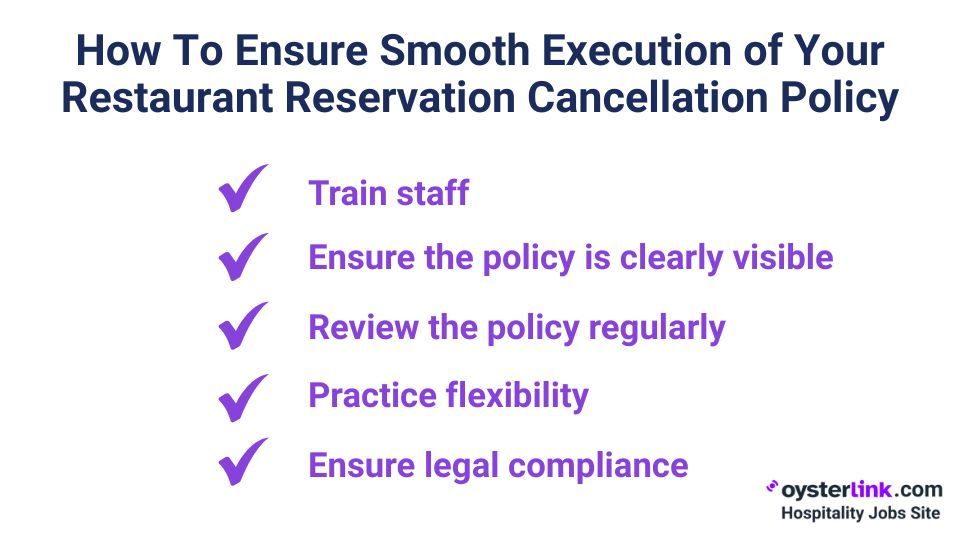Establishing a clear restaurant reservation cancellation policy can significantly reduce disruptions to your operations and safeguard your revenue.
This article offers useful templates and shares expert tips to help you implement an effective strategy.
Why Is It Important To Have a Restaurant Reservation Cancellation Policy?
A solid reservation cancellation policy is key to smooth restaurant operations. It helps protect the restaurant’s interests while setting clear expectations for diners.
With a well-defined policy, restaurants can tackle several important aspects of their business:
- Revenue protection: No-shows and last-minute cancellations can significantly impact a restaurant's bottom line. A well-defined policy helps mitigate these losses by encouraging guests to honor their reservations or provide timely notice of changes.
- Resource optimization: With a clear understanding of expected guest arrivals, restaurants can better allocate staff, ingredients and table arrangements. This leads to improved efficiency and reduced waste.
- Customer experience: A transparent policy helps manage guest expectations and reduces confusion or disappointment. It also allows the restaurant to accommodate walk-ins or waitlisted guests more effectively.
- Reputation management: Consistently enforced policies contribute to a restaurant's professional image and can help prevent negative reviews stemming from misunderstandings about reservation practices.

That said, let's look at the key components of an effective cancellation policy and what should be included to make it work well for both the restaurant and its guests.
4 Key Components of an Effective Restaurant Reservation Cancellation Policy
By including the following components, restaurants can create a cancellation policy that is fair and effective in managing both guest expectations and operational efficiency.

1. Cancellation timeframe
Set a clear timeframe for when guests can cancel without penalties. Depending on your restaurant’s size and popularity, this timeframe might range from a few hours to several days.
For instance, a small, intimate dining venue might require 48 hours’ notice, while a larger establishment might allow same-day cancellations.
2. No-show policy
Define what happens if a guest doesn’t show up for their reservation without notifying the restaurant.
Common approaches include charging a no-show fee, particularly if a credit card was required at booking or placing restrictions on future reservations.
3. Late arrival guidelines
Establish how long the restaurant will hold a table for late-arriving guests. A common practice is to hold tables for 15–20 minutes, after which the reservation may be released to walk-in diners.
Include details about whether late arrivals may result in a reduced dining time or, in some cases, automatic cancellation.
4. Group booking procedures
Large parties often require special terms to ensure smooth operations. Outline policies for group bookings, such as requiring a deposit, minimum spend commitments or advance notice for changes.
This helps prevent disruptions to the restaurant’s schedule and protects against potential losses.
While optional, a force majeure clause is highly recommended. It covers unforeseen events like severe weather or natural disasters, protecting both the restaurant and guests from penalties in cases of unavoidable disruptions.
Crafting Your Restaurant's Reservation Cancellation Policy

When developing a reservation policy, it's crucial to strike a balance between protecting your business interests and maintaining customer goodwill.
Here are some practical tips to help you create a policy that meets your restaurant’s unique needs while remaining fair and guest-friendly:
- Assess your restaurant's needs: Consider factors such as seating capacity, average meal duration and peak hours to determine appropriate booking and cancellation windows.
- Research industry standards: Look into common practices within your restaurant category and local market to ensure your policy aligns with guest expectations.
- Consult with staff: Gather input from front-of-house staff, including Hosts/Hostesses and Managers, who interact directly with guests regarding reservations.
- Use clear language: Write your policy in simple, concise terms, avoiding industry jargon that might confuse guests.
- Include flexibility: Build in some room for discretion to handle unique situations or loyal customers without compromising the policy's integrity.
If you don’t have time to craft a cancellation policy from scratch, don’t worry — this is where we jump in.
In the next section, you’ll find ready-to-use templates to help you create a policy that’s both effective and professional.
Customizable Restaurant Reservation Cancellation Policy Templates
To help you save both time and effort, we've put together a set of customizable templates that you can easily tailor to fit your restaurant's needs.
These ready-to-use policies provide a solid starting point, allowing you to implement a clear and professional reservation cancellation system without the hassle of writing everything from scratch.
Standard dining establishment cancellation policy template
We appreciate your interest in dining with us. To ensure the best experience for all our guests, please note our reservation policy:
- Reservations can be made up to [X] days in advance.
- A credit card is required to secure bookings for parties of [X] or more.
- Cancellations must be made at least [X] hours before the reservation time.
- Late cancellations or no-shows may incur a fee of $[X] per person.
- Tables will be held for 15 minutes past the reservation time.
- We understand plans can change. Please contact us at [phone number/email] if you need to modify your reservation.
Thank you for your understanding and cooperation.
Fine dining restaurant cancellation policy template
To provide an exceptional dining experience, we kindly request your cooperation with our reservation policy:
- Reservations require a credit card to secure.
- A non-refundable deposit of $[X] per person is charged at the time of booking.
- Cancellations made 48 hours or more in advance will receive a full refund of the deposit.
- Late cancellations (less than 48 hours' notice) or no-shows forfeit the deposit.
- For parties of 6 or more, cancellations must be made 72 hours in advance.
- We will hold your table for 20 minutes past the reservation time.
By making a reservation, you agree to these terms. For any changes, please contact our reservations team at [phone number/email].
We look forward to providing you with an unforgettable culinary experience.
Casual dining cancellation policy template
We're excited to have you dine with us! Please note our reservation guidelines:
- No credit card is required for bookings of less than [X] people.
- For groups of [X] or more, we may ask for a credit card to hold the reservation.
- Please let us know if you need to cancel or change your reservation.
- If you're running late, give us a call, and we'll do our best to accommodate you.
- For no-shows or very late cancellations, we may limit future reservation privileges.
To make changes to your reservation, just give us a ring at [phone number].
Thanks for choosing [Restaurant Name]!
How To Communicate Your Restaurant Reservation Cancellation Policy To Guests

Clear communication of your reservation cancellation policy is crucial for managing guest expectations and preventing misunderstandings.
Whether guests book online, by phone or through other channels, it’s important to ensure they are aware of your policy before confirming their reservation.
Below are the best practices for effectively communicating your policy across different reservation scenarios.
Website and app reservations
For restaurants using an online reservation system or app, ensure your cancellation policy is visible as guests complete their booking. Display the policy on the reservation confirmation page or include a reminder before the booking is finalized.
If the policy isn’t shown before confirmation, follow up with an email that includes all the details. This ensures guests are aware of the policy and have a written reference.
Email and text message reservations
When guests book via email or text message, send a confirmation that includes all reservation details and your cancellation policy. Ensure the policy is clear, especially regarding cancellation deadlines, fees and any deposit requirements.
If there are any changes or cancellations, guests can respond directly to your email or text message. You may also want to send a reminder closer to the reservation date, reiterating the cancellation policy to avoid any surprises.
Phone reservations
When reservations are made over the phone, it's essential to verbally communicate your cancellation policy to the guest during the call. After the conversation, follow up with an email that confirms the reservation details, including the cancellation policy.
In-person reservations
When guests make a reservation in person, ensure that your staff informs them of the cancellation policy during the booking process.
Additionally, you can provide a printed copy of the policy on the reservation card or receipt.
Following up with an email after the visit to confirm the details further reinforces your policies and keeps everyone on the same page.
Social media or third-party platforms
If your restaurant accepts reservations through third-party platforms like OpenTable, Facebook or similar services, your cancellation policy should still be communicated to guests.
While these platforms might not allow for detailed policy inclusion at the point of booking, you can use messaging features to send the policy after the reservation is made.
How To Ensure Smooth Execution of Your Reservation Cancellation Policy
Once your reservation cancellation policy is in place, it’s essential to integrate it seamlessly into your restaurant’s operations.
Here’s how you can make sure everything runs smoothly:
- Train staff: Ensure all front-of-house staff — including Hosts, Servers and Managers — understand the cancellation policy and can explain it confidently to guests.
- Make it visible: Display the policy clearly on your website, reservation platforms, and in-house materials. Include a brief summary in confirmation emails or texts.
- Review regularly: Monitor cancellation rates, no-show data, and feedback to see if updates are needed to keep the policy effective and fair.
- Allow flexibility: Maintain consistency but permit exceptions for loyal guests or special situations to support satisfaction and loyalty.
- Stay compliant: Verify that your policy follows local laws regarding deposits, fees and customer rights to avoid legal issues.

Adapting Your Policy for Special Circumstances
While maintaining a standard policy is essential, flexibility in certain situations can improve guest relations.
During peak periods like holidays (Valentine’s Day, New Year’s Eve), consider implementing stricter cancellation policies with longer notice requirements.
Private events, such as buyouts or exclusive dining experiences, can warrant more substantial deposits and longer cancellation notice periods.
In the case of inclement weather, establish a clear policy that balances safety with business needs.
Given recent global events, consider leniency for cancellations related to health emergencies.
For loyal customers, offering some flexibility with cancellation fees or providing a grace period can help maintain goodwill and encourage repeat business.
Tailoring your policy to accommodate these special circumstances not only ensures smoother operations but also demonstrates your commitment to customer satisfaction.
Measuring and Improving Restaurant Reservation Cancellation Policy Effectiveness
To ensure your restaurant reservation cancellation policy is serving its purpose, it's important to regularly assess its effectiveness and make improvements. Here's how:
- Track key metrics: Monitor data such as no-show rates, late cancellations and overall reservation fulfillment percentages.
- Gather guest feedback: Conduct surveys or informal conversations with guests to understand their perspectives on your policy.
- Analyze financial impact: Assess how the policy has affected your revenue, particularly in reducing losses from no-shows and late cancellations.
- Solicit staff input: Regularly consult with your front-of-house team for insights on policy implementation and guest reactions.
- Test different approaches: Consider testing different policy variations to see which is most effective for your restaurant.
- Schedule review sessions: Hold bi-annual sessions to discuss the effectiveness of the policy and identify potential adjustments.
Handling Cancellations and No-shows Gracefully
Even with a well-crafted cancellation policy, managing last-minute cancellations and no-shows requires finesse to maintain guest relationships and uphold restaurant operations.
When a cancellation occurs, it’s crucial to approach the situation with understanding.
Acknowledge that plans can change, and offer alternatives such as rescheduling or suggesting another available time.
For no-shows, it's important to stay professional and adhere to your policy, particularly if the reservation was secured with a credit card or deposit.
Maintaining a polite yet firm stance ensures the policy is respected while keeping the interaction respectful.
By communicating clearly and empathetically, you can mitigate any negative impact on your restaurant’s reputation, ensuring that guests still feel valued even if their original plans didn’t work out.
Streamline Your Restaurant’s Operations With OysterLink
By implementing a well-crafted reservation cancellation policy, restaurants can safeguard their operations, optimize resources and ensure a smooth dining experience for both staff and guests.
It’s about striking the right balance — protecting the business while maintaining customer satisfaction.
Having a clear, transparent policy not only prevents frustration but also enhances the restaurant’s professionalism and reputation.
For Restaurant Managers and owners looking to streamline their operations, including reservation systems and staffing, platforms like OysterLink can be invaluable.
With OysterLink’s suite of resources and tools, restaurants can better manage their workforce and enhance operational efficiency.
Whether you're looking to hire top-tier staff or gain industry insights, OysterLink is here to help.











Loading comments...